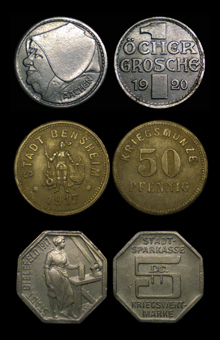Notgeld Coinage
Welcome to the world of Notgeld Coinage presented with brief information pertaining to each coin such as country, city, town, person or theme depicted on the coin.
Notgeld (pronounced: note-gelt), meaning "not" (emergency, necessity, need, distress) and "geld" (money), is a term used for the wide variety of mostly German or Austrian small change emergency money issued by local governments, businesses, organizations, and even individuals during the time of crisis in and around World War I. Although notgeld was issued over a wider time span, most coins on these pages were minted between 1914-1923. These interesting footnotes in numismatic history were produced at the local level to fill the need for currency not being met by the federal government. They were generally issued for the lowest denominations and were considered 'small change'.
Their practical use was limited, many were minted just to be sold and collected much like one would baseball cards. There are thousands of types with wide ranging, artistic, social and political themes using mostly alternative material such as iron, zinc, porcelain, paper, leather, aluminum foil, and cloth. More than 20 private minting firms have been reported as having struck notgeld coins, the vast majority were struck by L. Christian Lauer, Kugel and Fink, Heinrich Arld, Carl Poellath, Wilhelm Meyer and Franz Wilhelm, B.H. Mayer, and C. Balmberger.
Although many examples are stunning in their artistry and creativity, in many cases, the reverse of the piece carried the value and the obverse simply carried the name of the town and coat of arms. Thus, it was required to only make a die for each new obverse and use a standardized die for the reverse. Browse the coins to learn more and take a trip through early 20th century Germany by way of notgeld. Examples of Notgeld Notes or Serienscheine can be found HERE.





















